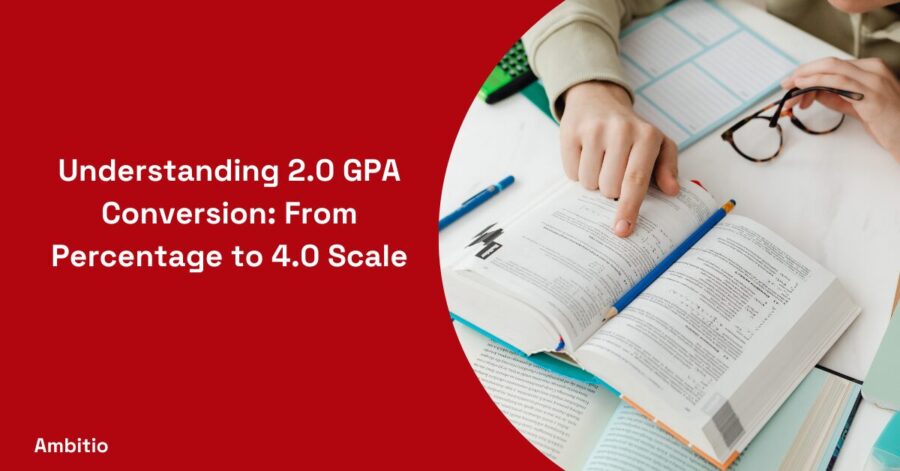14 December 2024
6 minutes read
Understanding 2.0 GPA Conversion: From Percentage to 4.0 Scale

Introduction
When it comes to academic performance, understanding your GPA is crucial. GPA, which stands for Grade Point Average, serves as a vital indicator of your academic achievements. In this comprehensive guide, we will delve into the conversion of a 2.0 GPA, exploring how to calculate it, and why it’s essential for your educational journey.
The Importance of GPA
Your GPA plays a significant role in your educational journey and beyond. Here, we’ll discuss why GPA matters and how it can impact your future.
GPA: A Key Academic Metric
Your GPA is not just a number; it represents your academic performance throughout your educational career. Schools and institutions use it to assess your capabilities, and it can be a deciding factor for college admissions, scholarships, and even job opportunities.
The 4.0 Scale: Decoding the Grading System
Before we dive into GPA conversion, let’s take a closer look at the 4.0 scale, the standard grading system in the United States.
How the 4.0 Scale Works
- A = 4.0
- B = 3.0
- C = 2.0
- D = 1.0
- F = 0.0
Understanding these values is essential for calculating your GPA accurately.
GPA to a 4.0 Scale Conversion
Converting your GPA to a 4.0 scale is essential, especially if you’re planning to apply for colleges or scholarships in the United States. To do this, follow these steps:
- Convert Letter Grades: First, convert your letter grades (A, B, C, etc.) to their respective numerical values using the 4.0 scale mentioned above.
- Calculate the Average: Calculate the average of these numerical values for all your courses. Add them up and divide by the total number of courses.
- Understanding Percentages: If your GPA is in percentage format, you can use the following formula to convert it to the 4.0 scale: 4.0 Scale GPA = (Percentage / 100) * 4.0
Maximizing Your GPA
Now that you understand the basics of GPA and how to convert it let’s explore ways to maximize your GPA and boost your academic success.
Strategies for Improving Your GPA
Achieving a high GPA requires dedication and effective strategies. Here are some tips to help you improve your academic performance:
1. Stay Organized
Effective time management and organization are essential. Use planners, digital calendars, or to-do lists to keep track of assignments, deadlines, and study sessions.
2. Attend Classes Regularly
Showing up for classes is crucial. Consistent attendance ensures you don’t miss important lectures or assignments.
3. Actively Participate
Engage in class discussions, ask questions, and seek clarification when needed. Active participation can help you grasp concepts better.
4. Manage Your Study Time
Allocate dedicated study time for each subject. Break your study sessions into manageable chunks to avoid burnout.
5. Seek Help When Needed
Don’t hesitate to reach out to teachers, professors, or tutors if you’re struggling with coursework. They can provide valuable guidance and support.
The Impact of GPA on College Admissions
In the quest for academic excellence, extracurricular activities often take center stage as an integral part of a student’s holistic development. Beyond the classroom, these activities offer students a myriad of opportunities for personal growth, skill development, and social engagement.
Let’s delve into the multifaceted role that extracurricular activities play in a student’s life and how they can significantly impact GPA and overall success.
Diverse Extracurricular Landscape
Extracurricular activities encompass a wide range of pursuits, catering to various interests and talents. These activities can be classified into several categories:
1. Clubs and Organizations
Participation in clubs such as debate, robotics, or student government provides students with a platform to explore their passions, develop leadership skills, and collaborate with peers who share similar interests.
2. Sports and Athletics
Engaging in sports not only promotes physical fitness but also teaches teamwork, discipline, and time management. Sports teams offer a sense of camaraderie and competition that can be both personally rewarding and character-building.
3. Arts and Creative Endeavors
Activities like music, theater, dance, and visual arts allow students to express their creativity and hone their artistic talents. These outlets foster self-expression, imagination, and a deep appreciation for the arts.
4. Community Service and Volunteering
Giving back to the community through volunteer work instills a sense of empathy and social responsibility in students. It provides valuable life experiences and a broader perspective on societal issues.
Benefits of Extracurricular Involvement
Participating in extracurricular activities offers a plethora of benefits that extend well beyond the confines of the school or college campus. Here are some key advantages:
1. Skill Development
Extracurricular activities provide an avenue for students to acquire and enhance a diverse set of skills. Whether it’s public speaking, problem-solving, or artistic expression, these activities offer hands-on learning experiences that complement formal education.
2. Time Management
Balancing academics with extracurricular commitments teaches students invaluable time management skills. They learn to juggle responsibilities, prioritize tasks, and meet deadlines – essential skills for academic success.
3. Leadership and Responsibility
Many extracurricular roles involve leadership positions. Serving as a club president, team captain, or event organizer fosters leadership qualities, decision-making abilities, and a sense of responsibility.
4. Social Interaction
Extracurricular activities provide opportunities for students to build friendships, collaborate with peers, and develop their social skills. These interactions can lead to lasting connections and a supportive network.
5. Personal Growth
Engaging in extracurricular pursuits encourages personal growth and self-discovery. Students often discover new interests, passions, and talents that can shape their future academic and career choices.
6. Enhanced College Applications
For high school students, extracurricular involvement can significantly bolster college applications. Admissions committees often look for well-rounded applicants who demonstrate a commitment to their interests and community.
Impact on GPA
While extracurricular activities offer numerous advantages, students may wonder how these activities affect their GPA. Here’s a closer look at the relationship between extracurriculars and academic performance:
Positive Impact
- Time Management Skills: Engaging in extracurricular activities can enhance time management skills. Students who effectively balance their commitments are often better equipped to manage their academic workload.
- Motivation and Focus: Extracurriculars can provide motivation and a sense of purpose, which can translate into improved focus and dedication to academics.
Potential Challenges
- Time Constraints: Overcommitting to extracurriculars can lead to time constraints and potentially impact study time. It’s crucial to strike a balance between activities and academics.
- Academic Priority: While extracurriculars are valuable, academics should remain a top priority. Students should ensure they allocate sufficient time for studying and completing assignments.
College Admissions and GPA
Colleges consider several factors when reviewing applications, and GPA is one of the most influential. Here’s how GPA impacts the admissions process:
1. Demonstrated Academic Ability
Your GPA reflects your ability to excel academically. A higher GPA indicates a strong academic foundation and the potential to succeed in college-level courses.
2. Admission Requirements
Many colleges have minimum GPA requirements for admission. Meeting or exceeding these requirements is essential to secure a spot at your desired institution.
3. Scholarships and Financial Aid
A high GPA can also open doors to scholarships and financial aid opportunities. Many scholarships are merit-based and consider your academic achievements.
Challenges and How to Overcome Them
Achieving and maintaining a high GPA can be challenging. Let’s explore some common challenges students face and strategies to overcome them.
1. Balancing a Heavy Course Load
High-achieving students often take advanced courses, which can be demanding. To overcome this challenge, prioritize your workload, and seek help from teachers or tutors if needed.
2. Time Management
Balancing academics with extracurricular activities and social life requires effective time management. Develop a study schedule and stick to it to avoid last-minute cramming.
3. Handling Difficult Subjects
Not all subjects come easily to everyone. If you’re struggling with a particular subject, don’t be afraid to ask for help. Tutoring, study groups, and additional resources can make a significant difference.
4. Test Anxiety
Test anxiety can negatively impact your GPA. Practice relaxation techniques and test-taking strategies to perform your best on exams.
Conclusion
In conclusion, your GPA is a vital metric that can shape your educational and career path. Understanding how to convert a 2.0 GPA to a 4.0 scale is just the beginning. To maximize your GPA, focus on effective study strategies, active participation, and a well-rounded educational experience.
As you navigate your academic journey, remember that your GPA is not the only factor that defines your potential. Extracurricular activities, personal growth, and determination all contribute to your success.
Use this guide to empower yourself with the knowledge and tools needed to excel academically and reach your goals. Your GPA is a reflection of your hard work, dedication, and commitment to lifelong learning.
FAQs
Q1: Why is GPA important?
GPA is crucial because it reflects your academic performance and can impact college admissions, scholarships, and future opportunities.
Q2: What is a good GPA?
A good GPA typically falls in the range of 3.5 to 4.0 on the 4.0 scale, but it can vary depending on your goals and the institutions you’re applying to.
Q3: Can I improve my GPA?
Yes, you can improve your GPA by focusing on your studies, seeking help when needed, and staying organized.
Q4: How do colleges use GPA in admissions?
Colleges use GPA as one of the factors to assess your academic readiness. A higher GPA can improve your chances of getting accepted.
Q5: Is a 2.0 GPA bad?
A 2.0 GPA is considered a C average and may limit your options for college admissions. It’s essential to work on improving it if possible.

You can study at top universities worldwide!
Get expert tips and tricks to get into top universities with a free expert session.
Book Your Free 30-Minute Session Now! Book a call now




























